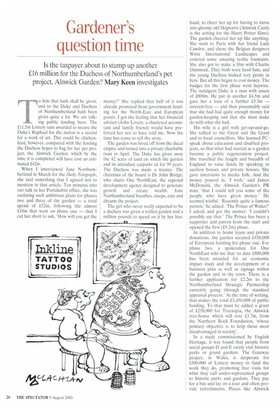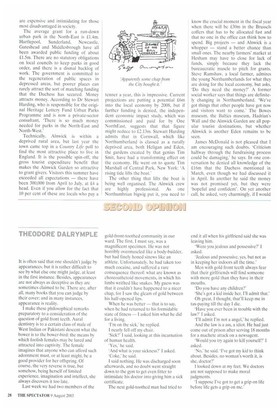Gardener's question time
Is the taxpayer about to stump up another
£16 million for the Duchess of Northumberland's pet project, Alnwick Garden? Mary Keen investigates To him that hath shall be given, and to the Duke and Duchess of Northumberland hath been given quite a lot. We are talking public funding here. The £11.5m Lottery sum awarded to secure the Duke's Raphael for the nation is a record for a work of art. This could be chickenfeed, however, compared with the funding the Duchess hopes to bag for her pet project, the Alnwick Garden, which by the time it is completed will have cost an estimated £42m.
When I interviewed Jane Northumberland in March for the Daily Telegraph, she said something that I agreed not to mention in that article. Ten minutes into our talk in her Portakabin office, she was outlining such ambitious plans for phases two and three of the garden — a total spend of £32m, following the almost £10m that went on phase one — that 1 cut her short to ask, 'How will you get the money?' She replied that half of it was already promised from government funding for the North-East and European grants. I got the feeling that her financial adviser (John Lovett, a chartered accountant and family friend) would have preferred her not to have told me. Now the time has come to tell the story.
The garden was hived off from the ducal empire and turned into a private charitable trust in April. The Duke has given away the 42 acres of land on which the garden and its attendant carparks sit for 99 years. The Duchess was made a trustee. The chairman of the hoard is Dr John Bridge, who chairs One NorthEast, the regional development agency designed to generate growth and create wealth. Jane Northumberland breathes, sleeps, eats and dreams the project.
The girl who never really expected to be a duchess was given a walled garden and a million pounds to spend on it by her hus
band, to cheer her up for having to move into gloomy old Hogwarts (Alnwick Castle is the setting for the Harry Potter films). The garden cheered her up like anything. She went to Paris with her friend Lady Cawdor, and chose the Belgian designers Wirtz International Landscapes and ordered some amazing techie fountains. She also got to make a film with Charlie Dimmock. They both wore hard hats, and the young Duchess looked very pretty in hers. But all this began to cost money. The budget for the first phase went haywire. The indulgent Duke is a man with assets of £800m. He put in another £4.5m and gave her a loan of a further £3.3m — interest-free — and then presumably said that she had had quite enough money for garden-keeping and that she must make do with what she had.
His wife is a girl with get-up-and-go. She talked to the Great and the Good and to local councillors. She learned PCspeak about education and disabled projects, so that what had started as a garden became a public regeneration project. She travelled the length and breadth of England to raise funds by speaking in auction houses and private houses. She gave interviews to media folk. And the money poured in. 'I wish,' said James McDonald, the Alnwick Garden's PR man, 'that I could tell you some of the people who have given money.' He seemed wistful. 'Recently quite a famous person,' he added. 'The Prince of Wales?' I asked, and got the answer: 'I couldn't possibly say that.' The Prince has been a supporter and patron from the start and opened the first (£9.2m) phase.
In addition to home loans and private donations, the garden secured £450,000 of European funding for phase one. For phase two, a spokesman for One NorthEast told me that `to date £800,000 has been awarded for an economic impact study and the development of a business plan as well as signage within the garden and in the town. There is a further application for £2.2m to the Northumberland Strategic Partnership currently going through the standard appraisal process.' At the time of writing, that makes the total £3,450,000 of public funding. To that must be added a grant of £250,000 for Treetopia, the Alnwick tree-house which will cost £3.7m, from the Northern Rock Foundation, 'whose primary objective is to help those most disadvantaged in society'.
In a study commissioned by English Heritage, it was found that people from social groups D and E rarely visit historic parks or grand gardens. The Gateway project, in Wales, is desperate for £500,000 of Lottery money to fund the work they do, promoting free visits for what they call under-represented groups to historic parks and gardens. They pay for a bus and lay on a tour and often provide refreshments. Places like Alnwick
are expensive and intimidating for those most disadvantaged in society. The average grant for a run-down urban park in the North-East is £1.4m. Hartlepool, Sunderland, Newcastle, Gateshead and Middlesbrough have all been awarded public funding of about £1.5m. There are no statutory obligations on local councils to keep parks in good order, and there is a dismal backlog of work. The government is committed to the regeneration of public spaces in depressed areas, but poorer places can rarely attract the sort of matching funding that the Duchess has secured. Money attracts money. According to Dr Stewart Harding, who is responsible for the original Heritage Lottery Fund Urban Parks Programme and is now a private-sector consultant, 'There is so much money needed for parks in the North-East and North-West.' Technically, Alnwick is within a deprived rural area, but last year the town came top in a Country Life poll to find the most attractive place to live in England. It is the possible spin-off, the gross tourist expenditure benefit that makes the Alnwick Garden so attractive to grant givers. Visitors this summer have exceeded all expectations — there have been 300,000 from April to July, at £4 a head. Even if you allow for the fact that 10 per cent of these are locals who pay a tenner a year, this is impressive. Current projections are putting a potential £6m into the local economy by 2008, but if further funding is denied, the independent economic impact study, which was commissioned and paid for by One NorthEast, suggests that that figure might reduce to £2.13m. Stewart Harding admits that in Cornwall, which like Northumberland is classed as a rurally deprived area, both Heligan and Eden, the gardens created by that genius Tim Smit, have had a transforming effect on the economy. He went on to quote Tim Marshall of Central Park, New York: 'A rising tide lifts the boat.' The other thing that lifts the boat is being well organised. The Alnwick crew are highly professional. As one Northumbrian bigwig put it, you need to knowthe crucial moment in the fiscal year when there will be £30m in the Brussels coffers that has to be allocated fast and that no one in the office can think how to spend. Big projects — and Alnwick is a whopper — stand a better chance than small ones. The nearby farmers' market at Hexham may have to close for lack of funds, simply because they lack the bureaucratic muscle to pitch for grants. Steve Ramshaw, a local farmer, admires the young Northumberlands for what they are doing for the local economy, but asks, 'Do they need the money?' A former social worker says that things are definitely changing in Northumberland 'We've got things that other people have got now and visitors want to come.' The Bowes museum. the Baltics museum, Hadrian's Wall and the Alnwick Garden are all popular tourist destinations, but whether Alnwick is another Eden remains to be seen. James McDonald is not pleased that I am encouraging such doubts. 'Criticism halfway through the fundraising process could be damaging,' he says. In one conversation he denied all knowledge of the £16m that the Duchess mentioned in March, even though we had discussed it in April. In another he said the money was not promised yet, but they were 'hopeful and confident'. On yet another call, he asked, very charmingly, if I would
like an injunction. His unpredictability and lack of transparency led me to try another tack. I rang One NorthEast to ask them to confirm that the Alnwick Garden Trust was getting about £16m. Their press officer left a message to say between 114m and £16m, he thought, but he would get back to me. He left another message to say, sorry, he had no information and that I should contact James McDonald for anything to do with the Alnwick Garden. My conversations with Mr McDonald continued, interspersed with glowing emails about successful rural regeneration. This I do not doubt. but I am left with three huge unanswered questions.
Firstly, will Alnwick be sustainable? Lord Rothschild, who pushed huge sums of money in the direction of urban parks during his chairmanship of the Heritage Lottery Fund, and now runs the exemplary National Trust Waddesdon Manor. has suggested that perhaps those who receive grants should expect to be governed by rules about sustainability. He also says that even the best-managed properties cannot expect to make a net profit of more than 10 per cent. Secondly, how will the everyday economy benefit? (One of the things the Duchess admitted to me in March was that they were considering European designers for future work, even though using foreign designers and sourcing plants from abroad had a bad press last year.) Last and largest of the questions is: should those who are savvier and nobler than thou attract so much more money than those who are perhaps more deserving?




































































 Previous page
Previous page